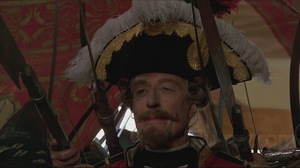The Adventures of Baron Munchausen

Born in Minnesota and educated in California, Terry Gilliam found his artistic calling in the heart of England in the late 1960s as a member of the Monty Python comedy troupe. His early work as their resident animator – famous for its distinct cut-out style and absurdist visuals – was integral to the Python aesthetic, earning recognition for its surreal humor and sharp political commentary. It would be with Python that Gilliam would first have the opportunity to direct a feature film, sharing the helming duties with Terry Jones on the influential and beloved Monty Python and the Holy Grail.
Released in 1981, Time Bandits marked Gilliam’s first solo feature following the group’s dissolution, solidifying his penchant for blending fantasy with biting satire and establishing him as a visionary in his own right. While Python had shaped his comedic sensibilities, his films would explore deeper, more complex themes reflecting his singular worldview, pitting the power of imagination against the constraints of bureaucracy and societal norms. His characters often find themselves caught between fantasy and reality, where the mind can serve as both an escape from the oppressive, dull systems of authority, as well as a source of its own set of dangers and consequences.
This conflict is most evident in his dystopian masterpiece Brazil (1985), where the hero battles against a nightmarish regime that suffocates his ambitions, with imagination serving as both a rebellion and a refuge. The clash between bureaucratic control and personal freedom recurs throughout his work, illustrating how systems of power seek to subjugate the individual, yet dreams provide a means of transcendence. Through these recurring themes, Gilliam offers a critique of modern life, exposing the rigid, often absurd structures that govern an increasingly systematized world while celebrating the chaos and liberation that unbridled creativity can unleash.
Representing the capstone of his unofficial “imagination trilogy”, The Adventures of Baron Munchausen (1988) stood as Gilliam’s most ambitious – and tumultuous – production to date. Based on 18th century German folktales of the Baron, his creative struggles during the film’s production mirrored its protagonist’s fantastical exploits, as the director faced a series of monumental challenges, both financial and logistical, that continuingly threatened to derail the entire project. The resulting adaptation is a work whose plot unravels into a swirling mix of surrealism, adventure, and satire, blending historical events, fantasy, and philosophical musings in an allegorical journey that defies conventional narrative structure.
The story opens with a city in chaos, under siege by the Turkish army, and though its inhabitants are struggling to hold out, hope arrives in the form of the flamboyant Baron Munchausen. The Baron, a larger-than-life figure known for his seemingly impossible feats, regales the citizens with tales of his past exploits and proposes, with the help of his colorful companions, to save the city from destruction. At the heart of the story is Sally, a young girl inspired by the tales of his adventures who longs for a more exciting life, sparking the beginning of their shared journey.
As the Baron recounts his past, the film unfolds as a series of increasingly bizarre and fantastical episodes, whisking the audience to various worlds that defy the laws of reason. Their first adventure takes them to the moon, where they encounter its eccentric, floating-headed King and his neglected wife. What begins as an amusing visit soon turns hostile, forcing a narrow escape. Landing in the fiery depths of Mount Etna, the Baron and his friends are welcomed by the jovial Roman god Vulcan and mesmerized by the radiant Venus, only to flee when Vulcan’s jealousy erupts.
Swallowed by a giant sea monster, the Baron and his allies cleverly orchestrate an escape by provoking a sneeze, returning just in time for a climactic battle that blurs the line between fantasy and reality. As the city teeters on the brink of collapse, the Baron, Sally, and their companions triumph over the oppressive forces in a dazzling showdown, though not without acknowledging the costs of their journey. The film concludes on a bittersweet note of reflection, suggesting that while imagination can provide a means of escape from the harsh realities of life, it also requires a delicate balance with the world around it.
From the outset, the production of Munchausen was famously plagued by difficulties. Grandiose set designs, elaborate costumes, and ambitious special effects pushed the limits of practical filmmaking, leading to costly delays and overruns. Gilliam’s vison for the film was enormous, demanding unprecedented levels of artistic ambition and technical ingenuity, resulting in constant conflicts with the studio and a staggering budget for a vision this independent. In addition to the financial pressures, the intricate sets and practical effects – including massive mechanical creations and elaborate miniatures – took a heavy toll on the cast and crew, creating grueling schedules and challenging conditions.
Despite these struggles, The Adventures of Baron Munchausen was completed and released in late 1988, opening domestically in early 1989. Though admired for its audacity and visual splendor, critics dismissed it as a chaotic, unfocused spectacle. The film was a box office disaster, as audiences failed to fully grasp both its satirical depth and its prescient exploration of the tension between freedom and societal constraint. Yet over time, it has gained a more appreciative audience, celebrated for its breathtaking visuals, its anarchic spirit, and its fearless critique of authority, as well as its unique approach to storytelling and cinema.
As one of his era’s most unconventional directors, Terry Gilliam’s directorial career is marked by both triumph and struggle, a journey filled with relentless ambition, creative defiance, and a unique blend of humor and visual spectacle. Although his films often find themselves at odds with mainstream sensibilities, his exploration of the human psyche combined with his commitment to practical effects have earned him a devoted following and an undeniably lasting influence. Uncompromising in his artistic integrity, Gilliam continues to challenge audiences provoke thought, and spark conversation, securing his legacy as one of modern cinema’s most daring and visionary filmmakers.
